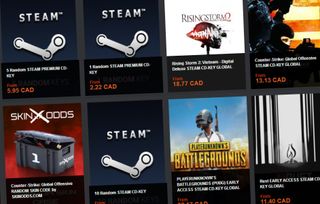G2A will soon require key sellers to provide their name and address to buyers (Updated)
But does it have to be their real name and address?

Update: G2A said in a statement that it already verifies identification information provided by sellers, and that what's changing in this update is that it will now make some of that information available to buyers.
"The personal information that sellers have to provide us must be in the form of specific documents such as bank statements. The way we verify will depend on the seller’s own business activity, for example we may require a certificate of incorporation from some sellers and a Taxpayer Identification Number from others," a rep explained. "However, as we have said before, we are not willing to go into detailed specifics of our verification process as a way to deter possible scammers from trying to find a way to get around them."
The rep also confirmed that the new geolocation feature will be mandatory for all users, and that the drop-down option to select a location will be removed.
Original story:
G2A is making changes to its marketplace that will require game key resellers to provide detailed information to their customers, including full names and addresses. The site said the changes, set to take place on July 1, will "give more transparency to buyers and more control to sellers."
“These changes are the next logical step towards making our marketplace more transparent,” a G2A rep told PCGamesN. “Every [buyer] should be able to know who they are buying from—this applies to G2A as well as to every other marketplace in the world. [Sellers] will now have to be more open to their buyers and provide more information."
The rep also positioned the change as good for sellers as well as G2A, saying that it's a chance for them "to build a real brand for themselves, one that does not only exist within the confines of G2A."
The biggest gaming news, reviews and hardware deals
Keep up to date with the most important stories and the best deals, as picked by the PC Gamer team.
Because some sellers are businesses, however, they won't have to use their home addresses, or presumably even real names. There's also no indication as to how stringent G2A will be with its new policy—whether it will require some sort of verifiable registration, or if a post office box owned by "Uranus Hertz Game Key Emporium" will be sufficient. If all that's required is an online form and maybe an email verification—basically the same process as signing up for Facebook—then it's probably not going to have much of an impact on people who use stolen credit cards to make bulk purchases and resales.
G2A is also adding a new "automatic geolocation" feature that it said will streamline its marketplace. "Buyers will no longer have to select their location from a drop-down menu when purchasing an item on G2A.com," it said in the announcement. "Instead, their location will be determined automatically using data taken from independent and reliable sources."
I've reached out to G2A for more information about how the system will work, and will update if and when I receive a reply.
Andy has been gaming on PCs from the very beginning, starting as a youngster with text adventures and primitive action games on a cassette-based TRS80. From there he graduated to the glory days of Sierra Online adventures and Microprose sims, ran a local BBS, learned how to build PCs, and developed a longstanding love of RPGs, immersive sims, and shooters. He began writing videogame news in 2007 for The Escapist and somehow managed to avoid getting fired until 2014, when he joined the storied ranks of PC Gamer. He covers all aspects of the industry, from new game announcements and patch notes to legal disputes, Twitch beefs, esports, and Henry Cavill. Lots of Henry Cavill.
Most Popular







